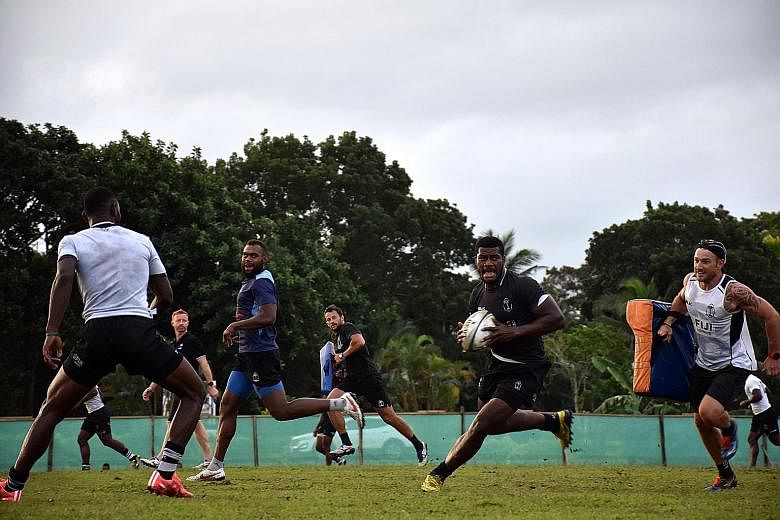Fiji ground to a halt at 8pm on July 16 as their Prime Minister Frank Bainimarama announced a message of national importance.
One by one, 13 names were read out in a ceremony that was beamed live on several television channels and streamed on the Internet.
The 13 men, including one reserve, comprise the rugby sevens team for the Olympic Games, and each of their names could be written in the history books next week.
Heading to Brazil as reigning back-to-back HSBC World Rugby Sevens Series champions, they are strong favourites to win Fiji's first Olympic medal since the Commonwealth nation made its debut 60 years ago at the 1956 Melbourne Games.
Yet the only colour that the rugby-obsessed country of less than a million will settle for is gold. In fact, this demand was made by the Prime Minister, who has flown to Rio to support his countrymen.
Fiji's rugby sevens coach, Ben Ryan, 44, said: "We joke about it. If we don't win it, I shouldn't be coming back to Fiji."
Never before has Fiji entered the Olympics carrying so much hope. But as rugby sevens makes its Olympic debut in Rio, Ryan's men will shoulder all the expectations, even if they are just part of a record 54-strong contingent competing in 10 sports.
Still, Ryan spoke matter-of-factly about delivering at the Games.
"It's a pressure that we're more used to than other teams," he said.
Since taking over at the helm in September 2013, Ryan, who coached England for six years, guided Fiji to the world series title, including the most prestigious round in Hong Kong, for the past two seasons.
"The country demanded that we win in Hong Kong, the tournament where we are under the most pressure, and we did.
"We've had an incredibly successful past couple of years and we've delivered each time," said the Englishman.
"When I took up the job, it (the goal) was straightforward: To get the team back to No. 1 and win a gold medal at the Olympics. We've done part one of that and now it's time for part two."
They hold a combined 29-8 win-loss record this year against the other 11 teams in Rio.
"We're going in as No. 1 seeds, heavy favourites, we've got winning records against every team in the world in the last three years. So the odds are in our favour and that gives us a lot of confidence," he said.
All eyes will be following the team's Olympic debut against Brazil at 4.30am in Fiji (12.30am, Singapore time) next Wednesday, two days before the final.
Assistant coach of the women's rugby sevens team, Iliesa Tanivula, said: "These boys will stop the nation. Wherever you are, whether in town or in the village, everyone will sit down to watch.
"Even where there's no TV, people will just sit around a radio."
In the villages, routines are being adjusted. Farmers will go to work in the tapioca plantations a few hours later than usual and fishermen will not go on overnight spearfishing trips on match days.
In Navotua, a remote village where electricity is only available one day each week, an antenna will be specially installed so that their community of 75 can watch the games on a TV in their town hall.
And should they fail to pick up a good signal from the network, they will either travel by boat to a neighbouring village to watch, or listen to live commentary on the radio.
Farmer Teveta David, 52, said: "Rio is what we're all looking forward to every day."
At the team's training base at the Uprising Beach Resort last month, fans lined the perimeter of the grass field to watch the team train. Some travelled for four hours to get to Pacific Harbour - 50km east of the capital, Suva - just to get a glimpse of their heroes in action.
Even though the players might appear to be lacking the most modern facilities, they made full use of the natural environment. They charged up and down the sand dunes at Sigatoka repeatedly, till they were exhausted.
Ryan said of their twice-a-day training sessions: "It's probably the hardest training the boys have ever had in the past three years. We've had them on sand dunes, spent two hours there and you can't really move after that. I've had days here (on the field) under the burning sun when we make them run and run and run, and then they think it's finished but we make them carry on.
"We try to break them mentally and physically to become as tough and resilient as possible."
Powerful and hard-tackling forward Semi Kunatani feels they are now in even better shape than when they won the world series.
The gentle and soft-spoken 24-year-old star said: "We have been going like this for the last few years. But the Olympics are the biggest thing for us, so we have to prepare even harder to become tougher to compete at this level."
Perhaps simplicity and a reminder of their roots have kept the players humble and relaxed.
Instead of cocooning themselves, they held their final training session in Fiji at a village.
At Nadi airport last Tuesday before they left Fiji for an eight-day high-altitude camp in Chile, their final tune-up for Rio, Ryan's men were given a huge send-off.
Airport staff chanted "Go, Fiji, Go" while vehicles on the tarmac honked as they boarded the plane.
Ryan said: "Fijians play best with a smile on their faces, not feeling as though all the pressure is on them and looking angry all the time. It's finally Fiji's moment to shine now."

